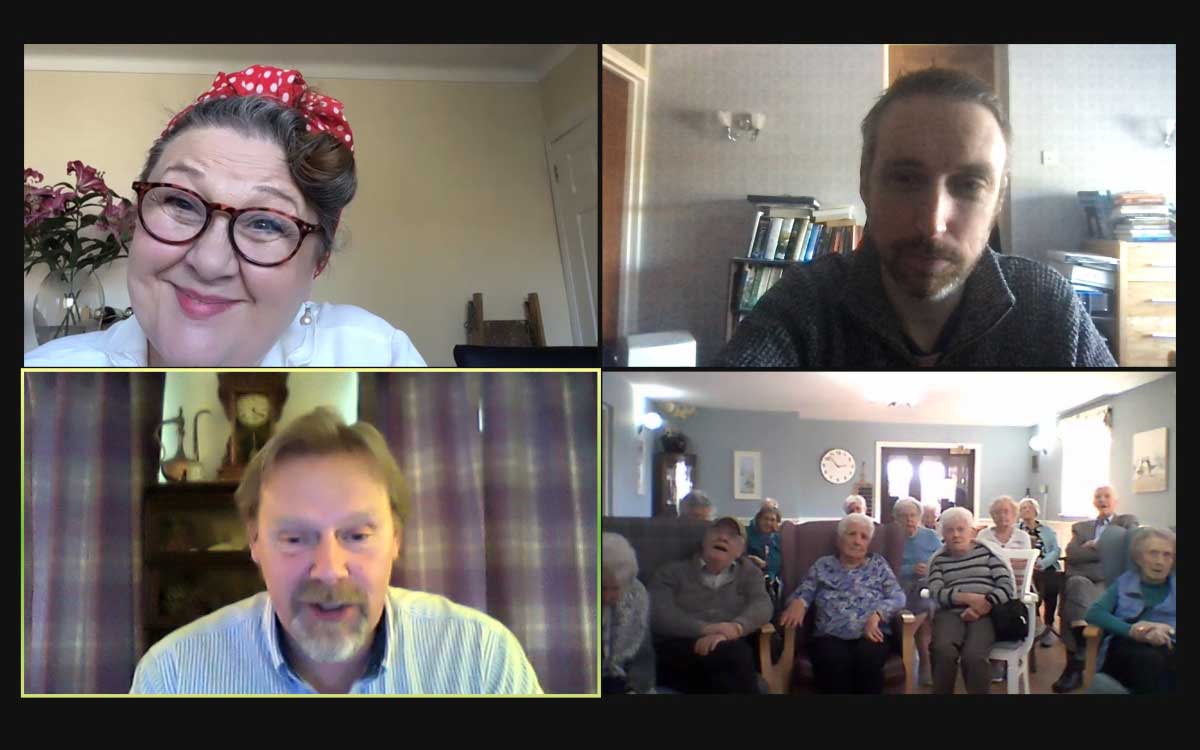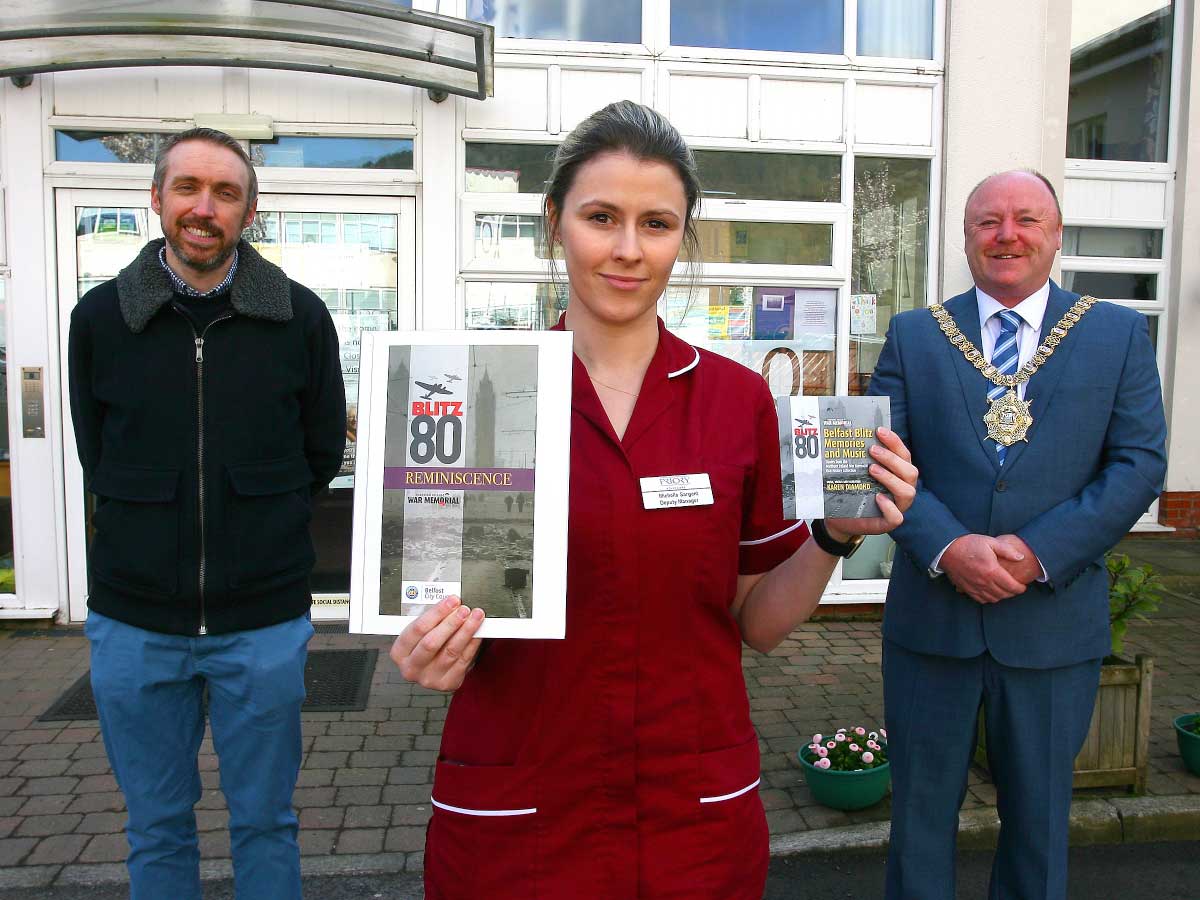By Michael Fryer, Outreach Officer at Northern Ireland War Memorial.
Like so many museums, the Northern Ireland War Memorial has had to adapt to meeting the challenges of operating in the “new normal” since the Covid-19 pandemic first forced us to close our doors to the public back in March 2020. In the midst of so much uncertainty, suddenly we found ourselves forced to find new ways of reaching our audiences. What is also clear is that this has been a period when the museum has embraced opportunities to form new partnerships and found renewed focus in promoting wellbeing through our programmes.
Migrating outreach and engagement to the digital sphere
These two areas came together early on in lockdown when the museum took part in an online pilot project from the Northern Ireland Museums Council’s (NIMC) Dementia Friendly Museums programme. Based on a previous face-to-face pilot, Love to Move was a series of workshops combining reminiscence and armchair aerobics based on a dementia friendly exercise programme developed by the British Gymnastics Foundation.
We partnered with exercise facilitator Karen Hutchinson and Kirk House Care Home in East Belfast to deliver six themed workshops on Zoom with residents in May-June 2020. The success of this project led to a second NIMC online pilot with Kirk House in the autumn of 2020 called Memories, Movement and Museums, this time incorporating a Covid-secure loan box for the participants. The addition of the loan box made a real difference to the Zoom workshops, bringing a multi-sensory element to the reminiscence sessions which was particularly appreciated by those residents living with dementia.
 NIWM's NIMC-funded 'Museums and Storytelling' Zoom session with the residents of Kirk House Care Home.
NIWM's NIMC-funded 'Museums and Storytelling' Zoom session with the residents of Kirk House Care Home.
Having never worked with Kirk House before, it has been a pleasure to engage with the staff and residents over the past year trying out creative approaches to virtual workshops. Recently we ran a third NIMC dementia friendly online pilot in partnership with storytellers from the Armstrong Storytelling Trust and the response from the care home residents was again very positive. As one member of staff commented on our outreach sessions: “They came just when needed with the isolation of lockdown, the residents really needed something else to think and talk about.”
The success of these digital pilots with the clear evidence of the benefits for participants’ health and wellbeing has spurred us on to offer virtual workshops to other care homes during lockdown. This has included running an online version of our Sing for Victory singing and reminiscence workshops with music therapist Karen Diamond. The fact that we have been forced by the pandemic to develop virtual outreach sessions has been a great opportunity to make new connections across Northern Ireland, bringing much needed enjoyment to audiences who have otherwise had to shield during lockdown.
Supporting conflict veterans' wellbeing
Covid-19 has also provided us with the chance to reconnect with our charitable purposes as an organisation. The Northern Ireland War Memorial was founded partly to provide amenities and services for the support of veterans and their families and in our current premises we continue to provide office space for ex-service charities.
Early in 2021 we approached our tenant charities with the idea of running a virtual pilot programme for their service users, providing an online space for veterans to come together and share in themed sessions based on a common interest in the military history of the Second World War. We partnered with veterans’ charity Help for Heroes on this pilot and at their request included not just their service users from Northern Ireland but also those based in Scotland, something that again was only possible through an online programme.
One of our main aims with the project was to promote wellbeing in the participants, especially as many veterans live with a complex range of issues including PTSD and isolation which have only been exacerbated by lockdown. Following the example of a veterans’ wellbeing programme run by Combat Stress and Aldershot Military Museum, we used the UCL Museum Wellbeing Measures to try and evaluate the impact of the sessions on the group. We found from the participants’ questionnaire responses that we got a mean score of 4.5 out of 5 across all wellbeing measures, indicating a positive engagement with the sessions.
The veterans also worked on their own model-making project as part of the programme which was something that brought added enjoyment between weekly meetings. Feedback was very encouraging, with one disabled veteran and his elderly parents saying how much they appreciated being able to take part in the sessions as a family. We hope to continue to develop similar outreach programmes with other veterans’ groups in future.
Marking Second World War anniversaries during lockdown
While circumstances have meant that most of our outreach programmes have been delivered online over the past year, we have also managed to develop physical resources for the public as well. Given that we are a Second World War museum, we have marked significant anniversaries during lockdown including the 75th anniversary of VE Day in May 2020 and the 80th anniversary of the Belfast Blitz in April 2021.
For these anniversaries we worked with music therapist Karen Diamond to produce CD recordings of wartime songs and relevant excerpts from our Oral History Collection. To accompany the CD we also designed reminiscence booklets which we posted out to care homes and community groups. These resources have proved very popular and have felt like a more tangible way to connect with our audiences during a period when many of us have felt Zoom fatigue.
 Launch of NIWM's Blitz 80 reminiscence packs at Cairnmartin Court Care Home with the Lord Mayor of Belfast, April 2021.
Launch of NIWM's Blitz 80 reminiscence packs at Cairnmartin Court Care Home with the Lord Mayor of Belfast, April 2021.
As we leave another lockdown and the museum reopens to the public again, we will continue to explore new partnerships and find creative ways to engage with the public through our outreach programmes, be that virtually or in person. Above all, we look forward to continuing to have a positive impact on people’s wellbeing through their participation in our workshops; if Covid has taught museums anything, it’s that the potential we have to make a difference in this area has arguably never been more needed.

